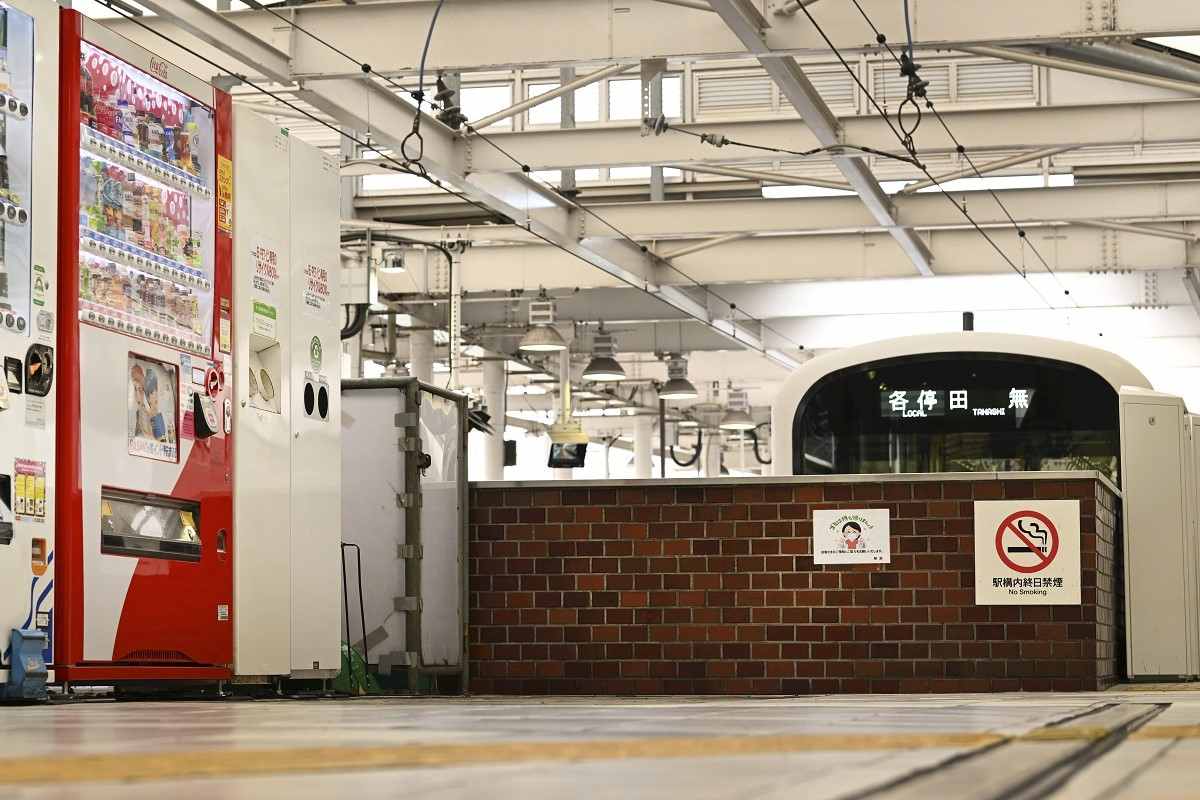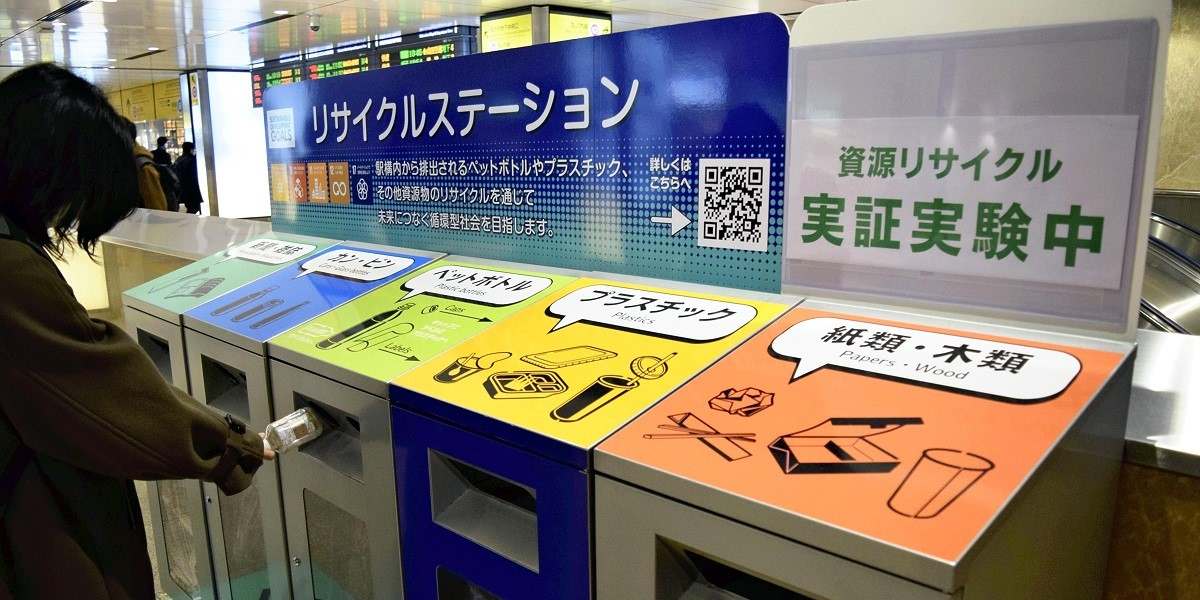
A platform at Seibu-Shinjuku Station is seen after trash cans were removed with only recycling bins remaining next to vending machines, in Shinjuku Ward, Tokyo, in January.
16:08 JST, February 6, 2023
Trash cans have been disappearing from train stations as railway operators have grown weary of passengers’ bad manners such as disposing of household garbage at stations.
Railroad companies were often required to seal off or remove trash cans for security reasons such as counterterrorism measures in the past, but now dustbins are being removed for sanitary reasons such as used masks being thrown away at stations amid the pandemic.
Of the 11 major railway operators in the Tokyo metropolitan area, only East Japan Railway Co. (JR East) has trash cans at stations.
Seibu Railway Co. removed all trash cans from stations in March 2021. A sign on the platform at Seibu-Shinjuku Stations states: “Take your trash home with you.”
Beverage makers place recycling bins next to vending machines to collect plastic bottles, cans and glass bottles. However, there is nowhere to dispose of tissues and other trash.
From April to June 2020, following a state of emergency declaration due to the spread of the coronavirus, Seibu Railway temporarily sealed off trash cans to mitigate the spread of infection via garbage. After the declaration was lifted, the company made trash cans available again, but began to often see cases in which used masks were discarded in dustbins.
Seibu Railway for a long time had trouble related to passengers’ bad manners regarding the use of trash cans, so the company decided to remove dustbins from all stations.
According to a Seibu Railway official, some complaints were initially made as to why only Seibu did not have trash cans at stations, but now there are almost none.
“We’ve gained a certain level of understanding,” the official said.
Customers’ reactions are divided.
“As long as safety measures are necessary and bad manners continue, it can’t be helped,” said a 48-year-old woman from Higashi-Murayama, Tokyo, who uses Seibu-Shinjuku Station.
A 78-year-old man from the same city said: “When I buy and eat food at the station, I can’t throw away the garbage. I want [them] to be installed again.”
Safety issue
Among the railway operators in the Tokyo area, Tokyu, Keikyu and Keio corporations were the first to have no dustbins at their stations.
After the 2004 Madrid train bombings terrorist attack, most Japanese railroad companies removed trash cans from stations as a safety measure. Many later reinstalled them due to requests from passengers, but some did not and continue to have none at stations.
The companies that had returned trash cans began to be bothered by bad manners, such as the disposing of garbage without sorting it as specified, which has become more common amid recent strict requirements for the sorting of household and other waste.
Some people threw out household garbage at stations, including food scraps and trash that is difficult to dispose of at home. There was even a case in which a hypodermic needle was found.
“It became a safety issue for cleaning contractors, too” said a Tobu Railway Co. official.
Against this backdrop, the coronavirus pandemic broke out, and seven railway companies began eliminating station trash cans from 2020 onward.

A traveler discards trash at a “recycling station” installed by East Japan Railway Co. on a trial basis at JR Tokyo Station.
JR East still has garbage cans at stations because it has huge terminals such as Tokyo Station, where a variety of items, including boxed lunches and souvenirs, are sold to many long-distance travelers.
The company has removed some trash bins mainly on conventional-line platforms, but is keeping them on platforms where Shinkansen bullet trains and limited express trains stop because many passengers throw out trash such as bento boxes there.
“Many stores operate at stations, so we don’t plan to remove all trash cans,” said an official at the JR East Metropolitan Area Headquarters.
However, JR East also suffers from passengers’ bad manners. Late last year, the company began a pilot program at Tokyo Station and two other stations to call the trash cans “recycling stations” and ask customers to sort their trash into five different types, up from three.
“By promoting recycling, we hope to raise customers’ awareness about waste,” said a JR East official.
Top Articles in Society
-

JAL, ANA Cancel Flights During 3-day Holiday Weekend due to Blizzard
-

Record-Breaking Snow Cripples Public Transport in Hokkaido; 7,000 People Stay Overnight at New Chitose Airport
-

Australian Woman Dies After Mishap on Ski Lift in Nagano Prefecture
-

Foreign Snowboarder in Serious Condition After Hanging in Midair from Chairlift in Nagano Prefecture
-

Train Services in Tokyo Resume Following Power Outage That Suspended Yamanote, Keihin-Tohoku Lines (Update 4)
JN ACCESS RANKING
-

Univ. in Japan, Tokyo-Based Startup to Develop Satellite for Disaster Prevention Measures, Bears
-

JAL, ANA Cancel Flights During 3-day Holiday Weekend due to Blizzard
-

China Confirmed to Be Operating Drilling Vessel Near Japan-China Median Line
-

China Eyes Rare Earth Foothold in Malaysia to Maintain Dominance, Counter Japan, U.S.
-

Japan Institute to Use Domestic Commercial Optical Lattice Clock to Set Japan Standard Time





















